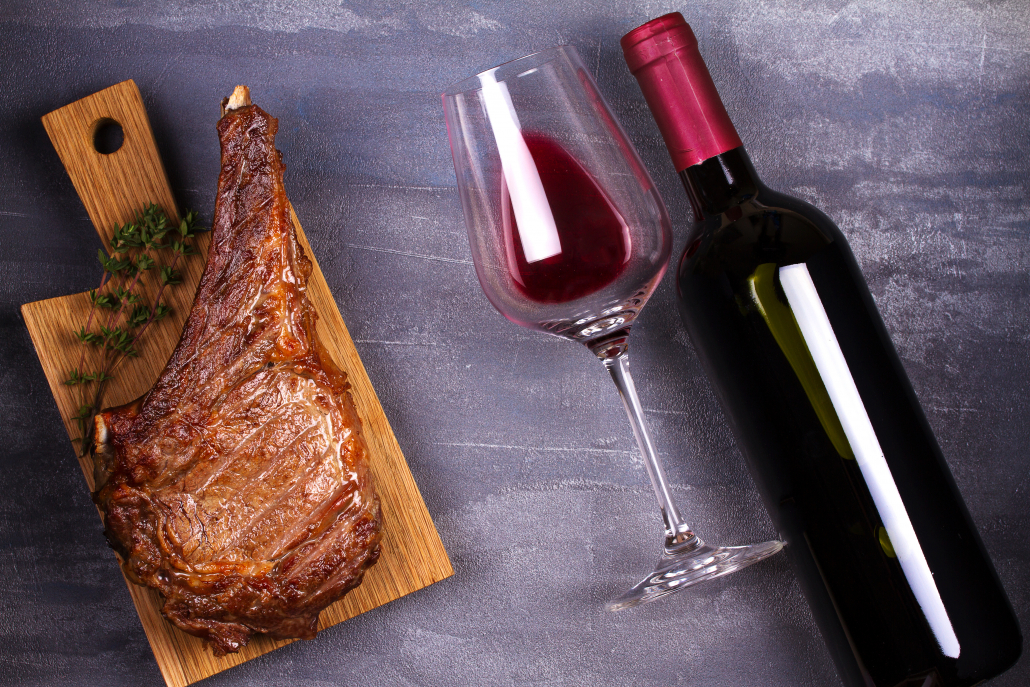We include products in articles we think are useful for our readers. If you buy products or services through links on our website, we may earn a small commission.
Can you Drink Alcohol on Keto? The Whole Truth

Table of Contents
- Is Alcohol Keto Friendly?
- Alcohol Can Interfere with Ketosis
- Alcohol can Cause Weight Gain
- Drinking Alcohol on Keto Can Make you More Intoxicated
- Alcohol on Keto May Make Hangovers More Severe
- Does Alcohol on Keto offer any Health Benefits?
- Keto-Friendly Choices
- Drinks to Avoid on Keto
- Can you Drink Alcohol on Keto? The Takeaway
Can you drink alcohol on keto?
The honest answer is, it depends. And in large part on how honest you can be with yourself.
If you’re in shape, have a healthy liver, a healthy relationship to alcohol, and you’re just wondering about the carbs in 1-2 drinks, the answer is, more of a “yes” than a “no”.
But alcohol is a toxic chemical/drug. So, while alcohol is often viewed as a necessary vice even by those with strict diet and health practices, those who aim to achieve the pinnacles of human health should likely avoid it in all but rare occasions.
In this article, we’ll explore how the body processes alcohol while on keto, highlight some side effects and pitfalls to watch out for, and offer a guide to choosing keto-friendlier alcohol options.
Is Alcohol Keto Friendly?
When looking at carb content alone, there are numerous low and no-carb alcohol options. But this doesn’t mean that drinking alcohol is a positive addition to your keto diet.
Nearly all alcohol is made from grains and grapes–foods that are always eliminated on a keto diet. Yet, when fermented, most of these carbs are turned into…alcohol.
This means that all distilled spirits have zero carbs. While red and white wine, along with light beer contains around 3-4 carbs per serving. The idea that alcohol is loaded with sugar, or that your body converts alcohol into sugar is a myth.
However, alcohol does contain calories–7 kcal per 1 gram. In fact, it’s often referred to as the 4th macronutrient group after fat, protein, and carbs.
| Type of Alcohol | Calories per 1 oz. |
| Light Beer | 13 calories |
| Wine | 24 calories |
| Vodka | 64 calories |
| Whiskey | 70 calories |
Even though unmixed alcoholic drinks can be relatively low in carbs, your body processes alcohol in a way that can interfere with the breakdown of fatty acids while in ketosis. This can cause undesirable consequences which we’ll turn to now.
Alcohol Can Interfere with Ketosis
When alcohol is absorbed into your bloodstream it’s first broken down into a toxic substance called acetaldehyde. Acetaldehyde is then broken down into acetate before finally being metabolized into water and carbon dioxide and eliminated from the body.
Because of alcohol’s toxic properties, the body prioritizes processing and eliminating it. And this occurs in the liver.
By prioritizing processing alcohol your body is less efficient at ketosis–the process of turning fatty acids into ketones.
Alcohol can Cause Weight Gain
At the same time that alcohol turns off ketosis, it also adds calories to your diet. Both from the alcohol itself, and from the extra food people tend to eat while drinking, and shortly after.
Exacerbates Food Cravings
One of the ways alcohol leads to weight gain is by stimulating similar reward circuits in your brain as carbs and sugar. In fact, studies suggest that access to sugar can be a gateway to alcohol use.
A study looking at 282 college students found that nearly half reported overeating and making unhealthy eating choices following drinking.
Another study found that “Alcohol also increased rated appetite once the food had been tasted, suggesting alcohol may increase food-related reward.”
All-star keto guru Maria Emmerich sums it up like this, “The more you drink the more you tend to eat; and unfortunately, drinking will make your liver work to convert the alcohol into acetate, which means that the foods you consume at this time will be converted into extra fat on your body.”
Drinking Alcohol on Keto Can Make you More Intoxicated
As we looked at earlier, when you consume alcohol your liver prioritizes ethanol metabolism over ketosis and gluconeogenesis (the process of turning protein into carbohydrates. The brain will receive less glucose and more acetone, leading to stronger and faster intoxication.
While eating lots of carbs can slow down alcohol absorption, on keto you don’t have that option. So it might be good to plan on drinking less and paying closer attention to how you feel after your first drink.
How to Protect Against Over-intoxication on Keto?
One way to protect against over-intoxication is to eat a typically satiating high-fat moderate protein keto meal before going out. And if low-carb veggies are part of your keto regimen, don’t skimp on the asparagus.
One animal study looking at the protective effects of asparagus against liver damage found that asparagus extract improved antioxidants and several markers of liver function and increased in mice with liver damage.
Two other test-tube studies found that asparagus is a robust source of antioxidants that prevent cell damage caused by excess alcohol consumption.
Alcohol on Keto May Make Hangovers More Severe
Though we don’t know exactly why this is the case, getting worse hangovers on keto is likely a result of dehydration due to electrolyte imbalances. When in ketosis, people tend to flush more fluids.
Be sure to alternate alcohol with water. If drinking with a meal, add salt. It may also be helpful to use an electrolyte supplement that includes magnesium and potassium.
Or make electrolyte supplementation part of a meal by enjoying keto bone broth. In addition to electrolytes, bone broth provides the added benefit of protecting your intestinal tract from inflammation.
Does Alcohol on Keto offer any Health Benefits?
Though there haven’t been any studies exploring the possible benefits of drinking alcohol on keto, there is evidence that moderate consumption of alcohol may offer some health benefits to some people.
Studies show that for women, moderate alcohol consumption can lower fasting insulin and glycemic levels, especially if consumed in the evening. These studies also tell us that moderate alcohol consumption does not lead to an increase in blood sugar for both men and women.
A 2006 study found that women drinking red wine at least once per week were 16% less likely to get diabetes than women who drank less regularly.
These outcomes occur because the liver prioritizes the metabolism of alcohol over complex carbs into blood sugar. So when on a low-carb, no-sugar keto diet, these effects are questionable.
However, It should also be noted that the alcohol-diabetes link has a serious limit. A 2009 study found that consuming more than 4 glasses of beer or wine per day for women and 4.5 for men, doubled the risk of type 2 diabetes.
Alcohol on a Mediterranean Keto Diet
Studies looking at the Mediterranean keto diet, which entails moderate red wine consumption, show favorable outcomes for numerous markers of cardiovascular health, along with a complete reversal of metabolic disease.
A Note on Moderation
Low-carb nutrition journalist Gary Taubs argues that epidemiological studies showing that moderate alcohol consumption is healthy could be completely bogus.
In a 2007 New York Times article, he writes, “The question I always had about these studies was whether or not people who drink alcohol in moderation are just different than the teetotalers, who drink none, and the binge drinkers, who drink to excess. Maybe by looking at a glass or two of alcohol a day you’re selecting out for people who live their entire lives in moderation, people capable of living well without excess.”
Keto-Friendly Choices
For many people, if enjoyed with care, alcohol can be a safe and pleasurable part of a keto lifestyle. Here’s a list of low-carb drinks so you can see how they stack up.
- Dry red wines like, Merlot, Pinot Noir, and Cabernet Sauvignon
- Dry white wines like Chardonnay, Champagne, Pinot Grigio, and Sauvignon Blanc
- Distilled liquors like mezcal, gin, vodka, tequila, rum, and whiskey
| Type of Alcohol | Serving Size | Carb Content |
| Rum | 1.5 ounces | 0 grams |
| Vodka | 1.5 ounces | 0 grams |
| Gin | 1.5 ounces | 0 grams |
| Tequila | 1.5 ounces | 0 grams |
| Whiskey | 1.5 ounces | 0 grams |
| Red Wine | 5 ounces | 3-4 grams |
| White Wine | 5 ounces | 3-4 grams |
| Light Beer | 12 ounces | 3 grams |
Drinks to Avoid on Keto
- Anything with tonic water. 12oz of tonic water contains a whopping 32g of sugars.
- Steer clear of regular and heavy beer
- When drinking wine, avoid Port, Moscato, and Riesling
- Fancy cocktails. Unless you make them yourself with keto-approved fixings
| Type of Alcohol | Serving Size | Carb Content |
| Bloody Mary | 1 cup | 10 grams |
| Regular Beer | 12 ounces | 12 grams |
| Margarita | 1 cup | 13 grams |
| Whiskey Sour | 3.5 ounces | 14 grams |
| Cosmopolitan | 3.5 ounces | 22 grams |
| Sangria | 1 cup | 27 grams |
| Pina Colada | 4.5 ounces | 32 grams |
Can you Drink Alcohol on Keto? The Takeaway
Though there are many low-carb alcoholic beverages, this doesn’t mean that they are necessarily keto-friendly. And it’s important to consider that alcohol in any form is a toxin that can be harmful, especially for people with medical conditions.
Your body processes alcohol differently on a keto diet. Drinking can halt ketosis, increase weight gain while leading to faster and stronger intoxication and worse hangovers.
Drinking on keto can also stimulate reward pathways in the brain associated with sugar cravings, making it easier to indulge in carb-heavy foods.
With all that said, there are likely no drawbacks to enjoying a drink or two every once in a while on a keto diet.
But ultimately the question, can you drink alcohol on keto? has to be answered by you.
Are you someone who can enjoy an occasional drink without going overboard? Do you have a history of alcoholism? Are you easily triggered by social pressures into overindulging?
Your answer to these questions is all way more important than the carb content of a drink.












